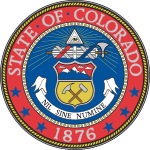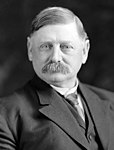
Alva Blanchard Adams was a Democratic politician who represented Colorado in the United States Senate from 1923 until 1924 and again from 1933 to 1941.

The 1912–13 United States Senate elections were held on various dates in various states. They were the last U.S. Senate elections before the ratification of the Seventeenth Amendment in 1913, establishing direct elections for all Senate seats. Senators had been primarily chosen by state legislatures. Senators were elected over a wide range of time throughout 1912 and 1913, and a seat may have been filled months late or remained vacant due to legislative deadlock. Some states elected their senators directly even before passage of Seventeenth Amendment. Oregon pioneered direct election and experimented with different measures over several years until it succeeded in 1907. Soon after, Nebraska followed suit and laid the foundation for other states to adopt measures reflecting the people's will. By 1912, as many as 29 states elected senators either as nominees of their party's primary or in conjunction with a general election.

Lawrence Cowle Phipps was a United States Senator representing Colorado from 1919 until 1931.
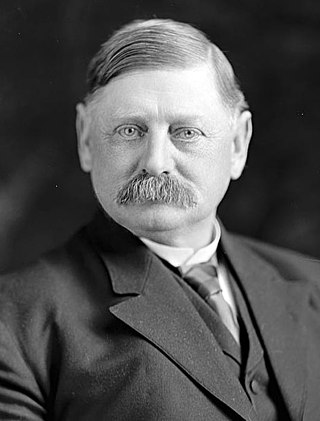
John Franklin Shafroth was an American lawyer and politician who served as a representative, member of the United States Senate, and Governor of Colorado during the late 19th and early 20th Centuries.

Charles Winfield Waterman was a Colorado attorney and politician. He is most notable for his service as a United States senator from Colorado.

The 2008 congressional elections in Colorado were held on November 4, 2008 to determine who will represent the state of Colorado in the United States House of Representatives, coinciding with the presidential and senatorial elections. Representatives are elected for two-year terms; those elected served in the 111th Congress from January 3, 2009 until January 3, 2011.

Fairmount Cemetery in Denver, Colorado, was founded in 1890 and is Denver's second oldest operating cemetery after Riverside Cemetery. It is located in land south-east of the intersection of the major Denver roadways Alameda Ave. and Quebec St.. The cemetery was designed by German landscape architect Reinhard Schuetze. The cemetery was patterned after Mount Auburn Cemetery in Cambridge and Watertown, Massachusetts. The cemetery occupies 280 acres (110 ha). The first year the cemetery opened over 4500 trees and shrubs were planted by Schuetze. The cemetery is the largest arboretum in the state.

The 2014 United States Senate election in Colorado was held on November 4, 2014 to elect a member of the United States Senate to represent the State of Colorado, concurrently with the election of the Governor of Colorado, other elections to the United States Senate, elections to the United States House of Representatives, and various state and local elections. Incumbent Democratic Senator Mark Udall ran for re-election to a second term, but narrowly lost to Republican U.S. Representative Cory Gardner by a margin of 1.9 percent.
James Quigg Newton Jr. was an American lawyer and politician who served as the mayor of Denver, Colorado from 1947 to 1955.
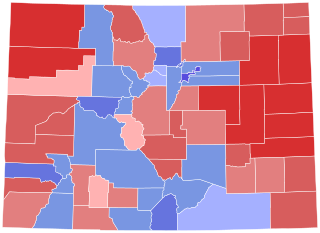
The 2016 United States Senate election in Colorado was held November 8, 2016, to elect a member of the United States Senate to represent the State of Colorado, concurrently with the 2016 U.S. presidential election, as well as other elections to the United States Senate in other states and elections to the United States House of Representatives and various state and local elections.

The 1948 United States Senate election in Colorado took place on November 2, 1948. Incumbent Democratic Senator Edwin C. Johnson was re-elected to third term in a landslide over Republican Will Nicholson, a businessman and Air Force veteran, winning every county in the state.

The 1936 United States Senate election in Colorado took place on November 3, 1936. Incumbent Democratic Senator Edward P. Costigan did not seek a second term in office. Democratic Governor Ed Johnson won the open race to succeed him over Raymond L. Sauter.
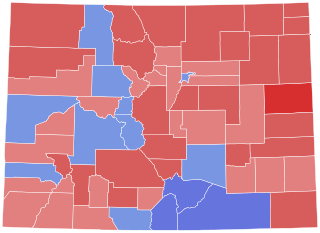
The 1944 United States Senate special election in Colorado took place on November 7, 1944. Incumbent Republican Senator Eugene Millikin, who was first appointed to fill Alva B. Adams's seat in 1941 and re-elected at the ensuing special election in 1942, ran for re-election to his first full term. In the general election, he faced wealthy Denver attorney Barney L. Whatley. Millikin benefited from the strong Republican performance in Colorado—Thomas E. Dewey and Governor John C. Vivian both won their respective elections by decisive margins—and cruised to a landslide victory over Whatley.

The 2020 United States Senate election in Colorado was held on November 3, 2020, to elect a member of the United States Senate to represent the State of Colorado, concurrently with the 2020 U.S. presidential election, as well as other elections to the United States Senate, elections to the United States House of Representatives and various state and local elections.
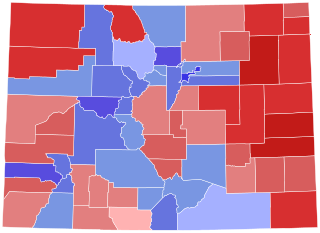
The 2022 United States Senate election in Colorado was held on November 8, 2022, to elect a member of the United States Senate to represent the State of Colorado. Incumbent Democratic Senator Michael Bennet won reelection to a third full term, defeating Republican businessman Joe O'Dea. Originally appointed to the seat in 2009, Bennet won full terms in 2010 and 2016.

The 1924 United States Senate special election in Colorado took place on November 4, 1924, to fill the remainder of the term for which Samuel D. Nicholson was elected in 1920. Nicholson died in office on March 24, 1923, and Democratic Governor William Ellery Sweet appointed Alva B. Adams, a prominent Pueblo attorney, to fill the vacancy. Adams, however, declined to be a candidate in the special election, instead challenging incumbent Republican Senator Lawrence C. Phipps in the regular election the same year.

The 1924 United States Senate election in Colorado took place on November 4, 1924. Republican Senator Lawrence C. Phipps ran for re-election to a second term. Senator Alva B. Adams, who held the other Senate seat, opted not to run for re-election in the special election, and instead decided to challenge Phipps for re-election. Adams's gambit turned out to be unsuccessful, as he lost to Phipps by roughly the same margin as Democrats lost the special election.

The 1930 United States Senate election in Colorado took place on November 4, 1930. Republican Senator Lawrence C. Phipps declined to run for re-election, resulting in an open race to replace him. Edward P. Costigan, one of the founding members of the Progressive Party in Colorado and a former member of the United States Tariff Commission, won the Democratic nomination and faced attorney George H. Shaw, the Republican nominee, in the general election. Aided by the nationwide Democratic landslide, Costigan handily defeated Shaw, becoming the first Democrat elected to the Senate from Colorado since 1914.

The 1912 Colorado gubernatorial election took place on November 8, 1912. Democratic state Senator Elias M. Ammons defeated the Progressive, Republican and Socialist candidates future Senator Edward P. Costigan, Clifford C. Parks and Charles A. Ashelstrom with 42.91% of the vote.

The 1932 United States Senate elections in Colorado took place on November 8, 1932. Incumbent Republican Senator Charles W. Waterman announced that he would not seek re-election to a second term. Attorney Karl C. Schuyler won the Republican nomination to succeed Waterman and faced former Senator Alva B. Adams, the Democratic nominee, in the general election.

